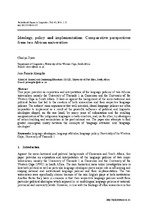Ideology, policy and implementation: Comparative perspectives from two African universities
Abstract
This paper provides an exposition and interpretation of the language policies of two African
universities, namely the University of Yaound in Cameroon and the University of the
Western Cape in South Africa. It does so against the background of the socio-historical and
political factors that led to the creation of both universities and their respective language
policies. The authors main argument is that well-intended, liberal language policies are often
impossible to implement as a result of the powerful influence of political and linguistic
ideologies shaped, on the one hand, by many years of colonisation and the resulting
marginalisation of the indigenous languages in both countries, and, on the other, by ideologies
of nation-building and assimilation in the post-colonial era. The paper also attempts to find
greater conceptual clarity between the concepts of language attitudes and language
ideologies.

